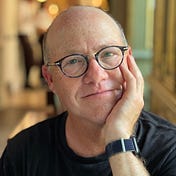I've always loved both writing and politics, but until I retired, I've ever written about politics. Till now.
I first knew I loved politics when Nixon was re-elected in 1968 and I saw my mother go nuts. She was in dismay, but not for the reasons one might think. She was studying political science at Kent State University (and later taught there in the 1970s), and she saw Nixon as a conservative with no morals, which she claimed had spawned a "new generation of Republicans."
But that's not what sparked my interest; it was humor. I discovered this when my mother spoke of the political spectrum as being more like a circle than a line: Those who harbor the most extreme political positions -- either liberal or conservative -- would frequently be indistinguishable from one another, and often occupy adjacent points on the circle. When I heard this, my humor nerve twitched, and I replied (with satirical intent), “No, the center of a circle is the furthest possible position from any other point.” She replied, “Yeah, and that’s called being a moderate, and everyone hates moderates, especially partisans that sit on the line.”
I died laughing.
And that's when I got hooked. Politics was the ideal place for my sense of humor, my amusement of the absurd, the hilarity of idiots, and the paradox of life itself: To govern oneself is a fool's errand. We just can't do it, but unless we try, the alternative is worse.
So, if I'm just getting started writing about politics now, what else have I been doing for sixty years?
The first twenty don't really count, so to speak, so we'll pick up where adulthood really began for me: after I graduated college.
I got my degree in computer science in 1985 with a focus on both artificial intelligence and user interface design, both of which were in their infancy by today's standards. (I wrote two books on the subject in 1987 and 1990.) This may seem far from politics, but what both have in common is having a deeper understanding of the human condition. To design products, you have to understand not just how people think, but find ways to predict how they will behave when they use new things, or interact with something unfamiliar.
I was always addicted to social matters, and interacting with people on computers was a perfect platform for me. I started my first software company in 1990 (as I was writing my second book) where we launched the first commercially available email system based on the newly emerging "internet protocols" that would later become a thing in the 1990s. Email to me was the ultimate social interaction, because I could engage with people all over the world. But I also knew there was something terribly unholy about this new kind of social interaction, which I wrote about in this article on how the internet affected American politics.
Dismayed with tech companies in Silicon Valley in the 1990s, I got an MFA in digital media and wrote four books that covered different aspects of photography and the digital realm. (I've also worked as an adventure travel photographer for 25 years, where you can see my work at danheller.com.)
In 2010, I started the Center for Entrepreneurship at UC Santa Cruz, where I designed and taught a series of courses where students would work with professors to start companies based on patents the professors had filed in association with their research. I later joined one of those companies, and grew it till my own retirement in 2018.
I now find great joy in doing what I've always wanted to do: Write about politics. It's the most insane, crazy, irrational behavior we humans can possibly engage in. And I do this because, above all else, I love humor. I live to laugh. As Dave Berg (Mad magazine cartoonist) famously said, "People are funnier than anybody!"
